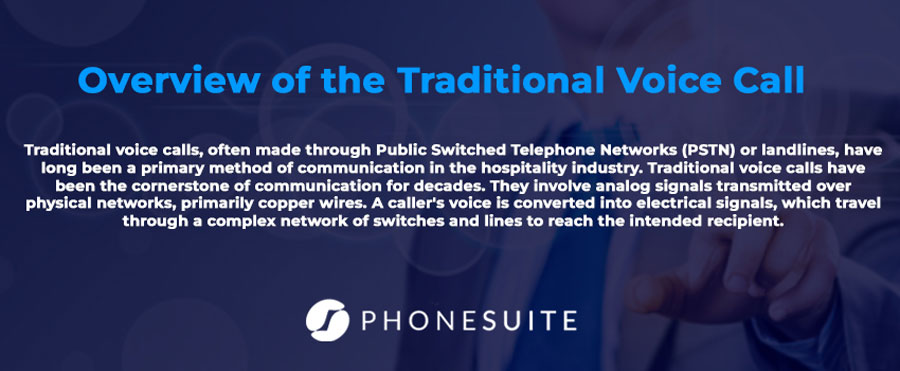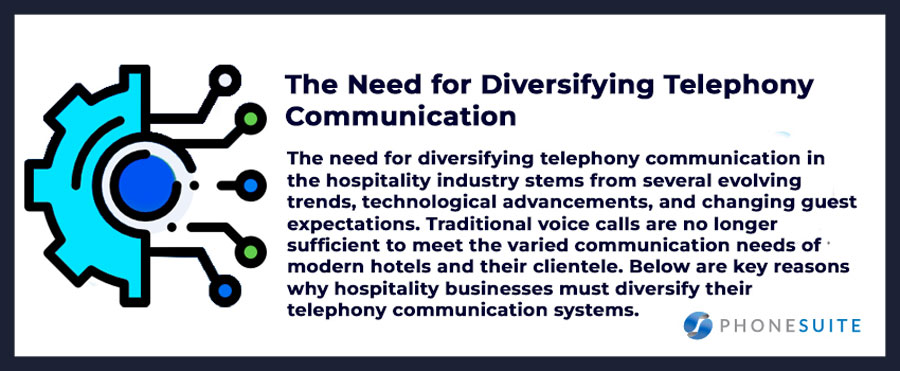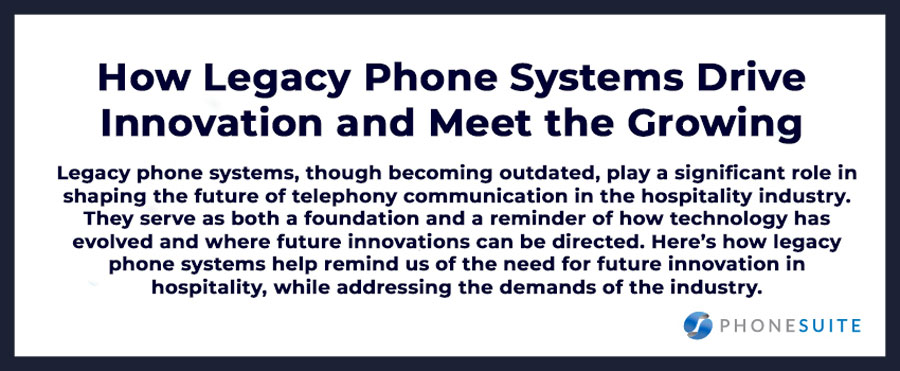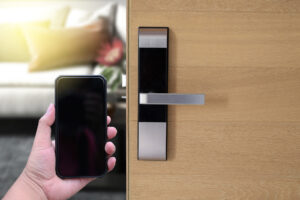
As a hotelier, the impact of remote work on communication methods presents an interesting challenge – one that requires you to think differently when it comes to ways of communicating with staff. As technology continues to evolve and employers become more geographically separated, telephone transactions are no longer limited to the standard dial-up voice calls traditionally used by hotels for guest inquiries or staff conferencing. In today’s world, there are countless new options for using telephony communication that can help your business stand out from competitors and maintain efficiency within your team even in stressful times! Whether it’s through VoIP phone systems, video chats, conference calling apps, or text messaging solutions, let’s take a closer look at how modern telephony solutions can help you communicate better in a remote working world.
Overview of the Traditional Voice Call

Traditional voice calls, often made through Public Switched Telephone Networks (PSTN) or landlines, have long been a primary method of communication in the hospitality industry. Here’s an overview of how they function and their role in the hotel sector:
1. Technology and Infrastructure
- Analog Signal: Traditional voice calls are transmitted via analog signals over copper wires.
- PSTN and PBX: Hotels typically rely on a Private Branch Exchange (PBX) system, which allows multiple internal phone lines to connect to external networks (PSTN) and route calls efficiently within the property.
- Telephone Handsets: In-room telephones are connected to the hotel’s PBX system, allowing guests to make both internal calls (e.g., room service, front desk) and external calls (e.g., local or international calls).
2. Common Use in Hospitality
- Guest Communication: Guests use in-room phones to contact various hotel services, such as the front desk, concierge, housekeeping, or room service.
- Internal Operations: Staff use voice calls to coordinate internally, especially in larger hotels where quick communication between departments (e.g., housekeeping, maintenance, and management) is crucial.
- Emergency Services: Traditional voice calls provide a reliable way for guests to contact emergency services, often via a direct-dial button (e.g., “9-1-1” or another emergency number).
- Wake-Up Calls: A traditional service where guests can schedule wake-up calls, an important feature for many business travelers.
3. Advantages
- Reliability: Traditional voice calls are highly reliable as they depend on established infrastructure (PSTN), which has been in place for decades.
- Simplicity: Guests of all ages are familiar with how to use a landline phone, making it user-friendly and accessible.
- Power Independence: Traditional landlines are often functional even during power outages, providing a critical backup communication system in emergencies.
4. Challenges and Limitations
- Limited Features: Unlike modern systems (VoIP or cloud-based), traditional voice calls lack features like call forwarding, conferencing, or integration with digital tools like PMS (Property Management System) or CRM (Customer Relationship Management).
- High Costs: Long-distance and international calls made over traditional landlines can be expensive, both for hotels and guests. Many guests avoid in-room phones due to high call charges.
- Maintenance: PBX systems and traditional phone lines require ongoing maintenance, which can be costly and time-consuming, especially as newer technology emerges.
- Decreasing Usage: With the rise of mobile phones and internet-based communication, guests increasingly prefer to use their smartphones or hotel apps to contact staff or services.
5. Decline in Popularity
As mobile and digital communication channels rise, the use of traditional voice calls in hotels has declined. Guests often use their smartphones for local and international calls via mobile networks or internet-based platforms like WhatsApp, Skype, or hotel-specific apps. Many hotels are reducing the presence of in-room phones as mobile communication takes over.
The Need for Diversifying Telephony Communication

The need for diversifying telephony communication in the hospitality industry stems from several evolving trends, technological advancements, and changing guest expectations. Traditional voice calls are no longer sufficient to meet the varied communication needs of modern hotels and their clientele. Below are key reasons why hospitality businesses must diversify their telephony communication systems:
VoIP Innovation Modern Era
The hospitality industry has witnessed a significant transition in the way it communicates with guests and manages operations. Traditionally reliant on landline phones, hotels and other hospitality businesses are now embracing a diverse range of communication channels to enhance guest experience, improve efficiency, and stay competitive.
Here are some key trends in the diversification of telephone communication in hospitality:
VoIP (Voice over Internet Protocol)
- Cost-effective: VoIP calls are often cheaper than transitional landline calls, especially for long-distance or internationally calls.
- Flexibility: VoIP systems can be integrated with other communication channels, such as message and video conferencing, offering a unified communication platform.
- Features: VoIP can provide advanced features like call forwarding, voicemail, and call recording.
Mobile Apps:
- Direct communication: Guest can use mobile apps to contact hotel staff directly for requests, inquires, or complaints.
- Instant messaging: Apps offer real-time messaging for quick and efficient communication.
- Push notification: Hotels can send targeted messages to guest, such as reminders about check-in times or special offers.
Messaging Platforms:
- SMS and MMS: Text messaging is a convenient way for guests to communicate with hotels, especially for quick requests or confirmations.
- Connectware Apps and other messaging apps: These platforms offer features like group chats and file sharing, which can be useful for coordinating group bookings or sharing information.
Cloud-Based Phone Systems:
- Scalability: Cloud-based systems can easily be scaled up or down to meet changing business needs.
- Remote access: Staff can access phone systems from anywhere with an internet connection.
- Integration: Cloud-based systems can be integrated with other business applications, such as property management systems and CRM software.
Changing Guest Preferences
- Mobile-First World: Many guests now prefer using their smartphones for communication. This means that traditional in-room phones are becoming less relevant, as guests rely on apps, text messaging, and VoIP platforms to communicate.
- Multichannel Expectations: Guests expect to interact with hotels through multiple channels, including voice, text, chat, and social media. Offering a range of communication options (mobile apps, chatbots, SMS) ensures that guests can choose their preferred method.
- On-Demand Convenience: Today’s travelers prioritize convenience and quick responses. Diversifying communication methods enables hotels to meet guest needs faster through multiple platforms, whether it’s a quick SMS or a chatbot answering common questions instantly.
Enhancing the Guest Experience
- Personalization: Diversified communication systems, like Unified Communications (UC) or mobile apps, allow hotels to personalize interactions with guests. For example, integrated platforms can track guest preferences, making it easier to offer customized services (room preferences, dining options) based on prior communications.
- Instant Access to Services: Guests can request services (room service, housekeeping, concierge) through chat, voice, or mobile apps at any time. The integration of smart devices, like Internet of Things (IoT) systems, allows guests to control room features or make service requests seamlessly.
- Contactless Communication: Post-pandemic, many guests prefer contactless interactions. Voice-activated systems, QR codes, and chatbots reduce face-to-face communication, creating safer and more hygienic environments.
Operational Efficiency
- Seamless Internal Communication: Diversified communication solutions help improve operational efficiency by ensuring that staff across different departments (housekeeping, maintenance, reception) can communicate more easily. Instant messaging platforms, task management apps, and collaboration tools streamline internal communications and help teams respond quickly to guest needs.
- Automation with AI and Chatbots: Automation tools like AI-powered chatbots can handle routine guest inquiries, freeing up staff to focus on more complex tasks. For instance, chatbots can manage simple requests (directions, reservations, FAQs) without involving human staff, improving response times and reducing the workload.
- VoIP and Cloud Systems: By integrating VoIP and cloud telephony, hotels can route calls, manage multiple communication channels, and log guest interactions through a central system, improving workflow and reducing missed calls or messages.
Cost Efficiency
- Reducing Landline Costs: Traditional phone systems come with high infrastructure costs, especially for long-distance and international calls. VoIP, messaging apps, and mobile apps help cut communication costs for both guests and the hotel.
- Cloud-Based Communication: Cloud-based systems are more cost-effective to maintain and upgrade compared to traditional PBX systems. Hotels can easily scale communication systems to handle fluctuating demands without significant infrastructure investments.
- Eliminating Redundancy: A diversified telephony system helps reduce redundancy by integrating multiple communication channels into one unified system. This reduces the need for separate systems and allows for more streamlined management.
Keeping Up with Technological Trends
- Voice-Activated Systems: The rise of smart speakers and voice-activated systems like Amazon Alexa for Hospitality or Google Assistant allows guests to interact with their rooms using voice commands, such as adjusting room temperature, turning on lights, or ordering room service.
- Internet of Things (IoT): IoT technology connects in-room devices like smart TVs, thermostats, and lighting systems to a central network, enabling hotels to offer connected experiences and automate processes. Guests can use voice or mobile apps to control room environments, enhancing comfort and convenience.
- 5G and Fast Data Networks: The growth of high-speed data networks like 5G enables hotels to provide faster and more reliable communication systems, supporting video calls, multimedia messaging, and streaming services.
How Legacy Phone Systems Drive Innovation and Meet the Growing Demands in Hospitality

Legacy phone systems, play a significant role in shaping the future of telephony communication in the hospitality industry. They serve as both a foundation and a reminder of how technology has evolved and where future innovations can be directed. Here’s how legacy phone systems help remind us of the need for future innovation in hospitality, while addressing the demands of the industry
Reliability as a Standard
- Proven Dependability: Legacy phone systems, especially PSTN (Public Switched Telephone Networks) and PBX (Private Branch Exchange) systems, have been reliable communication tools for decades. They set the standard for uninterrupted, high-quality voice communication, ensuring that guests and staff are always connected, especially in emergencies.
- Reminder for Resilience: As future innovations focus on cloud-based systems, VoIP, and mobile communication, the reliability of legacy systems should remind the hospitality industry to prioritize resilience and redundancy in new solutions, especially in critical situations like power outages or network failures.
Highlighting Limitations for Future Growth
- Lack of Flexibility: Legacy systems are often rigid and do not easily integrate with modern communication tools like customer relationship management (CRM) systems or property management software (PMS). This limitation highlights the need for flexible and scalable systems in future innovations, where integration with various platforms is crucial for improving guest experiences.
- Costly Maintenance: The ongoing maintenance costs of traditional PBX systems, along with the expensive charges for long-distance and international calls, remind us that cost-efficiency is a key demand in the hospitality industry. Future innovations must provide cost-effective alternatives, such as cloud-based systems that reduce hardware dependencies and streamline communication.
Simplifying the Guest Experience
- Familiarity for Guests: Legacy systems are easy to use and require little to no learning curve for guests. The simplicity of picking up a phone and dialing a number is something that future communication systems must not overlook. Innovations like voice-activated devices, AI-powered chatbots, and mobile apps must still prioritize ease of use and intuitive interfaces to ensure all guests, regardless of tech savviness, can interact effortlessly with the hotel’s services.
- Wake-Up Calls and Room Service: The basic functionality of requesting wake-up calls, room service, and other concierge services through a legacy phone is a core part of the guest experience. These features, though simple, remind us that guest convenience should remain a priority in new technologies. Future innovations should build on this by offering more personalized and customizable options, such as automated services through apps or voice commands.
Encouraging Innovation Through Historical Gaps
- Lack of Multichannel Support: One of the greatest limitations of legacy systems is their focus solely on voice communication, with no support for multichannel interaction (e.g., messaging, video, apps). The growing demand for multichannel communication—where guests can interact with the hotel via chat, mobile apps, or video—emphasizes the need for Unified Communications (UC) in future systems.
- Enhancing Guest Engagement: Legacy systems lack the personalization options that today’s travelers expect. For instance, they don’t offer personalized greetings, custom messages, or guest preferences tracking. This gap encourages innovation in areas like AI-powered communication systems that can remember guest preferences, anticipate needs, and provide personalized services, further enhancing guest engagement.
Paving the Way for VoIP and Cloud Systems
- Foundational Infrastructure: Legacy phone systems have paved the way for technologies like VoIP (Voice over Internet Protocol) and cloud-based communication systems, which offer more advanced features and integration. Without the foundational structure and learning from the limitations of traditional PBX systems, the hospitality industry wouldn’t have been able to explore VoIP’s flexibility, cost-effectiveness, and ability to connect guests through multiple channels (voice, video, chat).
- Cloud Scalability: The capacity limitations of legacy systems, especially in large hotels or chains, push the demand for scalable cloud-based systems, where the number of extensions and lines is virtually limitless. This shift is crucial for global hotels that require centralized management of communication across various locations.
Meeting Modern Guest Demands
- Mobile and Digital-First Guests: Today’s guests are increasingly mobile and prefer digital-first solutions for communication. Legacy systems highlight the gap between traditional voice calls and modern guest expectations for instant messaging, app-based service requests, and video conferencing. To meet these demands, the future of hotel telephony must offer multimedia communication, AI-powered service interactions, and seamless integration with mobile platforms.
- Omnichannel Experience: Legacy systems, while focused on voice, remind us that modern guests expect an omnichannel experience, where they can interact with hotels through multiple platforms—text, voice, video, social media, and apps. This need for diversification drives innovation in telephony communication, encouraging hotels to implement solutions that cater to various communication preferences.
Offer Innovative Hospitality Products & Services
Phonesuite’s innovative hospitality products and services offer a complete solution to hotels of all sizes. With Voice Management Platform, an easy-to-use mobile app, and secure VoIP calling systems, PhoneSuite can help you create personalized guest experiences while providing your business with the latest technology. As Phonesuite continues to lead the way in hotel communication solutions, think about taking advantage of their products and services next time you need an upgrade or addition for your business. Enhancing customer engagement and satisfaction will undoubtedly bring success to any operation. Invest in hospitality technology today with Phonesuite and experience increased profitability in the near future!
PhoneSuite solutions are powerful enough for the largest hotel chains yet cost-effective enough for hotels in all stages of business growth. A hotel phone system is a specialized telecommunications system designed to meet the unique needs of hotels and other hospitality establishments. It provides a range of features and services that enhance guest communication, convenience, and overall satisfaction. Contact us today to learn more about how we can help you with your business communication needs!
Get ready to turn your vision for success into a reality with Phonesuite- it’s time to take charge and be the leader in hospitality excellence!
If you’re ready to make the switch to a modern & innovative phone system, talk to Phonesuite today.



